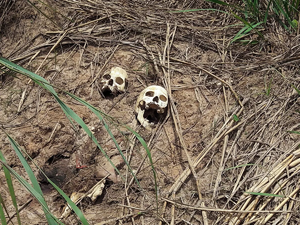Chélak Massacre: Difference between revisions
No edit summary |
No edit summary |
||
| Line 26: | Line 26: | ||
| commander2 = Jean-Luc Mignard{{KIA}} | | commander2 = Jean-Luc Mignard{{KIA}} | ||
| commander3 = | | commander3 = | ||
| units1 = 9th Battalion<br>10th Battalion | | units1 = 9th Battalion<br>10th Battalion<br>Local militia | ||
| units2 = 22nd Colonial Marine Infantry Regiment | | units2 = 22nd Colonial Marine Infantry Regiment | ||
| units3 = | | units3 = | ||
| Line 39: | Line 39: | ||
}} | }} | ||
The '''Chélak Massacre''' was an {{wpl|ambush}} and then {{wpl|massacre}} of an entire regiment of [[Sieuxerr|Sieuxerrian]] Colonial Marines. The marines were marching from Chélak to Bibré and were ambushed with a mixture of effective machine gun fire and roadside bombs. Later survivors were assaulted by waves of Husseinarti militia armed with machetes, all survivors of the attack were later killed. The massacre was described as a "disgusting war crime" by then-Emperor Napoléon V, with later Husseinartian President [[Théodore Boulet Sawadogo]] describing it as a "righteous showing of Husseinartian resolve". | The '''Chélak Massacre''' was an {{wpl|ambush}} and then {{wpl|massacre}} of an entire regiment of [[Sieuxerr|Sieuxerrian]] Colonial Marines. The marines were marching from Chélak to Bibré and were ambushed with a mixture of effective machine gun fire and roadside bombs. Later survivors were assaulted by waves of Husseinarti militia armed with machetes, all survivors of the attack were later killed. The massacre was described as a "disgusting war crime" by then-Emperor Napoléon V, with later Husseinartian President [[Théodore Boulet Sawadogo]] describing it as a "righteous showing of Husseinartian resolve". | ||
==Background== | |||
For the past few months since the start of Sieuxerrian-involvement in the [[Pan-Septentrion War|First Pan-Septentrion War]], the colonial government in Husseinarti was attempting to quell the various riots that had sprung up as a result of the sudden lack of colonial troops, then the later implementation of conscription of the natives to fight in Casaterra. For the whole time since, the indigenous Husseinarti People’s Council had been locked in intense negotiations with the colonial government. The HPC wanted to avoid outright military conflict and instead force the colonial government to ceed control to them as peacefully as possible. | |||
==Ambush== | |||
[[Category:Septentrion]] | [[Category:Septentrion]] | ||
[[Category:Sieuxerr]] | [[Category:Sieuxerr]] | ||
Revision as of 05:32, 23 March 2022
| Chélak Massacre | |||||||
|---|---|---|---|---|---|---|---|
| Part of First Pan-Septentrion War and The Struggle | |||||||
 Two marine bodies uncovered, 2015 | |||||||
| |||||||
| Belligerents | |||||||
|
|
| ||||||
| Commanders and leaders | |||||||
| Jean Yves Jerome | Jean-Luc Mignard † | ||||||
| Units involved | |||||||
|
9th Battalion 10th Battalion Local militia | 22nd Colonial Marine Infantry Regiment | ||||||
| Strength | |||||||
|
~2,000 militia 6 Hotchkiss machine guns 10 roadside bombs | ~1,500 marines | ||||||
| Casualties and losses | |||||||
| ~50 total | Entire force killed | ||||||
The Chélak Massacre was an ambush and then massacre of an entire regiment of Sieuxerrian Colonial Marines. The marines were marching from Chélak to Bibré and were ambushed with a mixture of effective machine gun fire and roadside bombs. Later survivors were assaulted by waves of Husseinarti militia armed with machetes, all survivors of the attack were later killed. The massacre was described as a "disgusting war crime" by then-Emperor Napoléon V, with later Husseinartian President Théodore Boulet Sawadogo describing it as a "righteous showing of Husseinartian resolve".
Background
For the past few months since the start of Sieuxerrian-involvement in the First Pan-Septentrion War, the colonial government in Husseinarti was attempting to quell the various riots that had sprung up as a result of the sudden lack of colonial troops, then the later implementation of conscription of the natives to fight in Casaterra. For the whole time since, the indigenous Husseinarti People’s Council had been locked in intense negotiations with the colonial government. The HPC wanted to avoid outright military conflict and instead force the colonial government to ceed control to them as peacefully as possible.